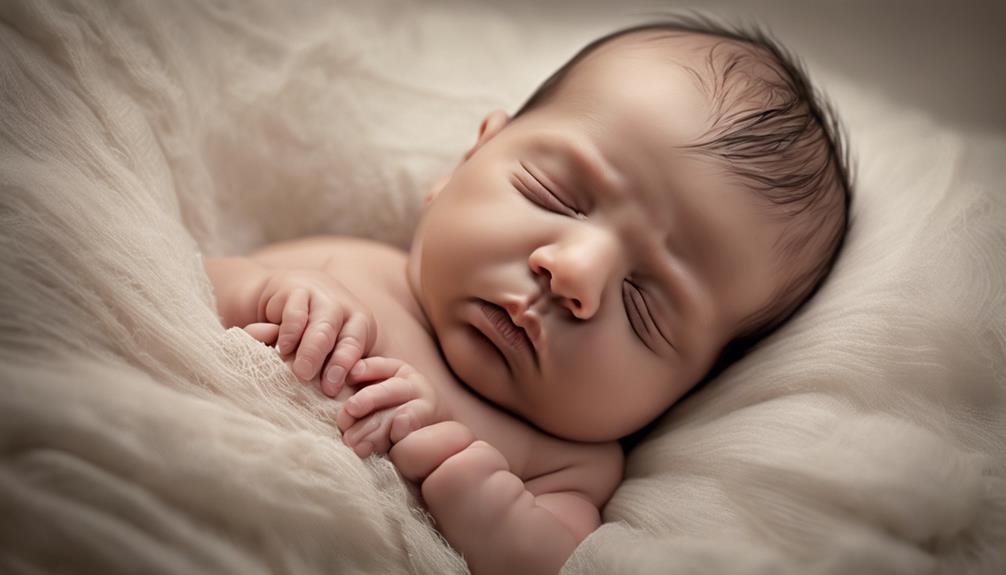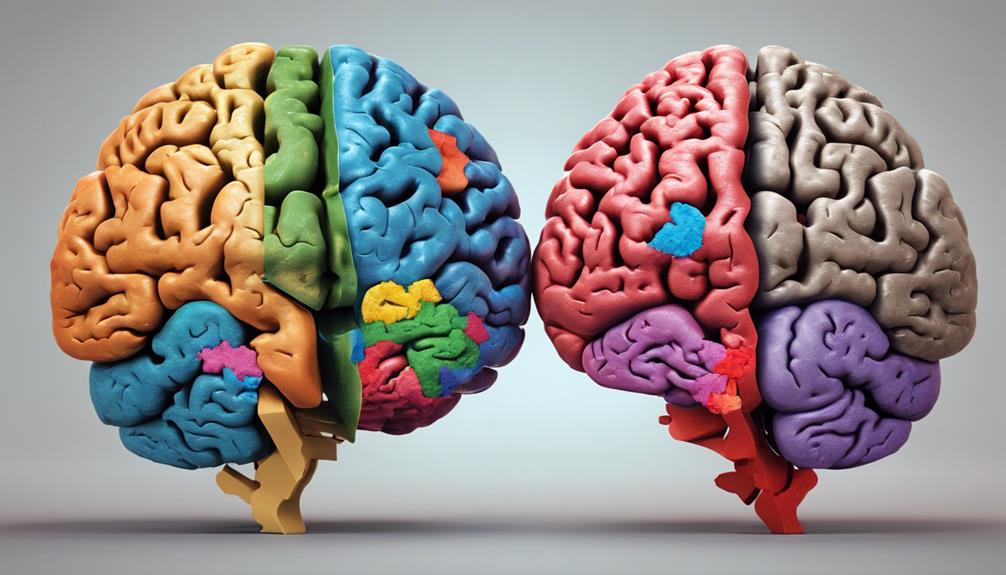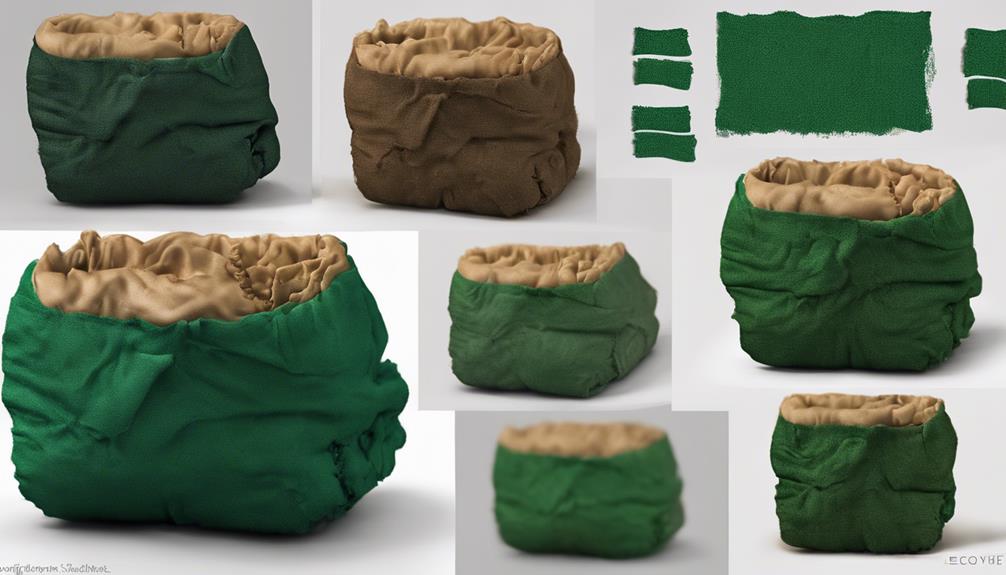Do you find yourself wondering why your newborn gets hiccups after every feeding?
The mystery behind this common occurrence might surprise you.
Understanding the reasons behind these persistent hiccups can provide insights into your baby's well-being and comfort.
Key Takeaways
- Hiccups post-feedings are common due to the developing digestive system.
- Frequency varies but can be reduced with proper burping and feeding habits.
- Causes include air swallowing, immature digestion, and overfeeding.
- Alleviate hiccups by burping, holding upright, using a pacifier, and maintaining a calm environment.
Common Occurrence of Newborn Hiccups
Newborn hiccups after every feeding are a common and expected occurrence in infants, often causing concern for parents but typically resolving on their own. These hiccups are a natural reflex tied to the early development of your baby's digestive system. After each feeding session, the diaphragm, a muscle essential for breathing, may spasm, leading to those adorable yet sometimes worrisome hiccups.
Your little one's developing digestive system is still getting accustomed to the process of taking in and digesting milk. As a result, hiccups after feeding are quite common and usually nothing to fret about. It's fascinating how these hiccups are actually a sign of your baby's growth and maturation.
Frequency of Hiccups Post-Feedings

If your baby experiences hiccups after feedings, the frequency of these occurrences can vary depending on factors such as overfeeding, eating speed, and air swallowing. Some newborns might hiccup after every feeding session, while others may experience them less frequently. Remember that hiccups after feedings in newborns are generally harmless and tend to resolve on their own without any intervention.
To help reduce the frequency of hiccups post-feedings, try burping your baby after each feeding to release any trapped air. Additionally, keeping your baby upright for a little while after feeding and ensuring a calm environment during feeding sessions can also aid in minimizing hiccups. These simple steps can make a difference in how often your baby experiences hiccups after feeding and contribute to a more comfortable feeding experience for your little one.
Understanding the Cause of Hiccups
Understanding the cause of hiccups in newborns after feeding can provide valuable insights into ways to alleviate discomfort and promote a more peaceful feeding experience for your little one. Newborn hiccups often occur due to various reasons such as swallowing air while eating, which can lead to air pockets in the stomach causing the diaphragm to spasm.
Additionally, the immaturity of the digestive system in babies can result in hiccups after feedings. Sudden changes in stomach temperature during or after feeding may also trigger hiccups, along with overfeeding or eating too quickly. It's important to take into account conditions like gastroesophageal reflux, where stomach contents flow back into the esophagus, as a potential cause of hiccups in newborns.
Alleviating Hiccups After Feedings

To help your baby find relief from hiccups after feedings, consider implementing simple strategies that can ease discomfort and promote better digestion. Here are some tips to alleviate hiccups effectively:
- Burping: Remember to burp your baby after each feeding to release trapped air and reduce the likelihood of hiccups.
- Upright Position: Hold your baby upright for about 20-30 minutes after feeding to aid in digestion and minimize hiccups.
- Pacifier: Offering a pacifier for your baby to suck on after feeding can help soothe the diaphragm and prevent hiccups.
- Calm Environment: Ensure a quiet and serene environment during and after feeding to reduce stress and potential hiccups.
- Small Sips of Water: If recommended by a healthcare provider, giving your baby small sips of water can help alleviate hiccups post-feedings.
Promoting Comfort for Baby

Promote your baby's comfort by incorporating simple strategies that can alleviate discomfort and enhance overall well-being. Holding your baby upright after feeding is an essential way to assist in the escape of air, potentially reducing hiccups.
Offering a pacifier post-feeding can help soothe your baby's diaphragm, aiding in minimizing hiccups. Techniques such as gently patting or rubbing your baby's back can release trapped air, providing relief from hiccups.
Creating a vital and quiet feeding environment is important as it reduces stress on your baby's digestive system, potentially decreasing the frequency of hiccups. Ensuring proper feeding techniques, including regular burping and feeding smaller amounts more frequently, can help minimize hiccups after feeding.
Frequently Asked Questions
Why Does My Newborn Get Hiccups After Every Feeding?
Your newborn gets hiccups after each feeding due to factors like overfeeding, fast eating, and immature digestion. These common hiccups usually resolve on their own. Try burping and holding them upright after feeds to help prevent hiccups.
How Do I Get Rid of Hiccups After Feeding My Baby?
To help your baby get rid of hiccups after feeding, try burping, keeping a calm environment, holding upright, offering a pacifier, and using proper feeding techniques. These methods can aid in releasing trapped air and promoting better digestion.
Is Constant Hiccups Bad for Babies?
Constant hiccups in babies after feeding aren't typically harmful. They often stem from factors like overfeeding or swallowing air. While frequent hiccups usually resolve on their own, persistent ones may warrant a healthcare provider's attention.
Is It OK to Lay Baby Down With Hiccups?
It's perfectly fine to lay your baby down with hiccups. Hiccups are common and don't usually disrupt breathing. If they persist or cause discomfort, consulting a pediatrician is wise. Keeping baby upright if hiccups are due to reflux can help.
Conclusion
To sum up, newborn hiccups after feedings are a common, yet harmless occurrence that can be managed with simple techniques.
By feeding smaller amounts, burping regularly, and holding your baby upright, you can help alleviate their discomfort.
Remember, these hiccups are part of your baby's development and will eventually resolve on their own.
Stay informed, stay calm, and trust in the process of your little one growing healthy and strong.









